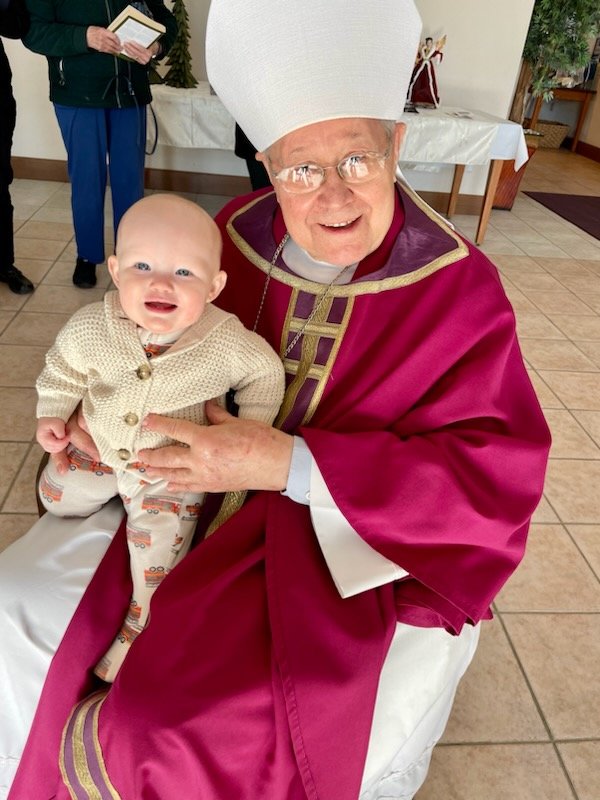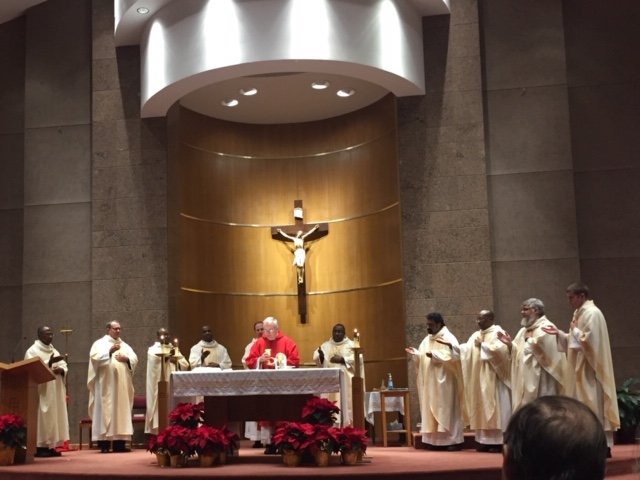Bishop Emeritus Gaydos shares memories, lessons from Pope Emeritus Benedict XVI
Presides, preaches homily at See City Deanery’s Memorial Mass for former pontiff

SCROLL THE ARROWS to see more photos.
Bishop Emeritus John R. Gaydos remembers looking out with all the other bishops from the Cathedral of St. Patrick sanctuary in New York City.
It was April 18, 2008. Pope Benedict XVI had just arrived to offer Mass for the religious brothers and sisters of the New York archdiocese.
The main doors of the cathedral were wide-open, offering an unusually panoramic view across Fifth Avenue, into the city.
“I was seated right behind the main altar,” Bishop Emeritus Gaydos recalled. “And St. Patrick’s is right across the street from Rockefeller Center. And there’s this statue, this sculpture, right across the street.”
The sculpture depicts Atlas, a brawny figure from Greek mythology, holding up the world.
“Well, the car stops outside the cathedral, and Pope Benedict gets out, and his figure covers the statue of Atlas,” Bishop Emeritus Gaydos recalled. “All you can see is the pope holding up the world.”
“I couldn’t think of a better description of the role of the successor of St. Peter in the Church!” the bishop emeritus stated.
This was one of three significant recollections he offered Jan. 6 in his homily for the See City Deanery’s Memorial Mass for Pope Emeritus Benedict XVI.
Pope Benedict, who led the Church from 2005 until he relinquished the papacy in 2013 due to age and ill health, died on Dec. 31 at age 95.
The pope emeritus had spent the years of retirement in study and prayer for the Church.
Bishop W. Shawn McKnight called for Memorial Masses to be offered for Pope Benedict in each of the diocese’s five deaneries.
Bishop McKnight, who was on a pastoral visit to Uganda, invited Bishop Emeritus Gaydos to preside at the See City Deanery Mass.
Bishop Emeritus Gaydos led the Jefferson City diocese from 1997-2018 — which included all of Pope Benedict’s papacy.
Priests who minister in the See City Deanery, which includes the Jefferson City and surrounding parishes, concelebrated the Mass in St. Andrew Church in Holts Summit.
“Invite people in”
“I have been thinking many things about this wonderful, wonderful Joseph Ratzinger, who was called to the See of Peter,” said Bishop Emeritus Gaydos.
Noting that the former pope was a splendid catechist, the retired bishop called to mind the homily Pope Benedict preached on that sunny April Saturday in New York.
“It was just spectacular,” he recalled. “He started by complimenting the beauty of the stained-glass windows in St. Patrick’s.”
The pope talked about how people walking outside would have no way of anticipating such beauty without coming inside to look.
“And he went on to elucidate how our work is simply to help invite people in and then once they see the beauty of God’s love and God’s grace, let God take care of the rest,” Bishop Emeritus Gaydos recalled.
“Dialogue of grace”
The third connection that came to mind for the retired bishop stemmed from the Gospel reading that was proclaimed at the Funeral Masses for Pope Benedict and his predecessor, Pope St. John Paul II.
In that passage from John 21, the Risen Christ asks Peter three times if Peter loves Him.
The third time, Peter responds in desperation: “You know, Lord, You know everything; You know that I love You.”
Bishop Emeritus Gaydos tied that to what Archbishop Georg Gaenswein, Pope Emeritus Benedict’s longtime secretary, had reported to be the former pope’s last words.
“One nurse who had been helping take care of him as he was ebbing away, heard him say in a very low voice, in Italian, ‘Signore, Ti amo’ — ‘I love You, Lord,’” said Bishop Emeritus Gaydos.
“Recall the Gospel passage, and you could almost imagine the dialogue going on, the dialogue of grace on those last hours of Benedict on earth: ‘Peter, do you love Me?’ ‘I love You, Lord.’” he said.
“Every one of us, this is our mission,” said Bishop Emeritus Gaydos. “This is all that matters.”
He encouraged the faithful to thank God for the pope emeritus’s inspiration and example.
“And ask the Lord,” he said, “to help us to grow in faith and to be EAGER sharers, as Benedict was, of this Good News that God has given us to share.”
After Holy Communion, the cantor chanted the ancient “In Paradisum” in Latin, asking the angels to lead the former pope into heaven.
The congregation sang “Faith of Our Fathers” for the recessional.
Faith, reason and truth
When Pope Emeritus Benedict retired in 2013, Bishop Gaydos predicted that the 264th successor to St. Peter would leave behind a decades-long legacy of scholarship and teaching that will continue to enlighten the Church for years to come.
“What I suspect he’ll be best remembered for is being such a great teacher,” Bishop Emeritus Gaydos said at that time.
He cited the retiring pope’s copious writings, including the three books in his Jesus of Nazareth series.
“Jesus of Nazareth is a great theological work,” said Bishop Emeritus Gaydos. “Anyone can really grow in appreciation for the Second Person of the Trinity, true God and true man, by reading those books. And you don’t have to be a theologian to understand them.”
The pope emeritus also left behind an astonishingly diverse cache of writings, lectures, interviews and homilies from his days as a young professor in Regensburg, Germany; as a theological consultant at the Second Vatican Council; as archbishop of Munich and Freising; and for 24 years as prefect for the Church’s Congregation for the Doctrine of Faith.
Bishop Emeritus Gaydos was particularly struck by an address Pope Benedict delivered in Germany’s newly reconstructed government building in Berlin in 2011.
That address was one of numerous occasions when the then-pope asserted the essential relationship between faith and reason.
“Very powerfully, the Pope stated that the Christian faith has never proposed religion as the basis for social order, but the Christian faith has always appealed to human reason and to human nature,” Bishop Emeritus Gaydos noted.
“In today’s world,” he continued, “where the very idea of truth is often sidelined in favor of utility and practicality, Pope Benedict made an impassioned plea for us to listen to our own human nature, to learn what the truth about ourselves is.”
And there, addressing German dignitaries, Pope Benedict called for a renewed, respectful dialogue between religious and secular society.
“He acknowledged that the secular world plays a very important role in the Church as a healthy critic, calling us to greater purity and goodness of life,” Bishop Emeritus Gaydos recalled.
The retired bishop is convinced that Pope Emeritus Benedict XVI’s impressive body of teaching and writing “will continue to yield a great treasure for us for many, many years to come.”
Comments
Other items that may interest you
Services
The Catholic
Missourian
2207 W. Main St.
Jefferson City MO 65109-0914
(573) 635-9127
editor@diojeffcity.org







